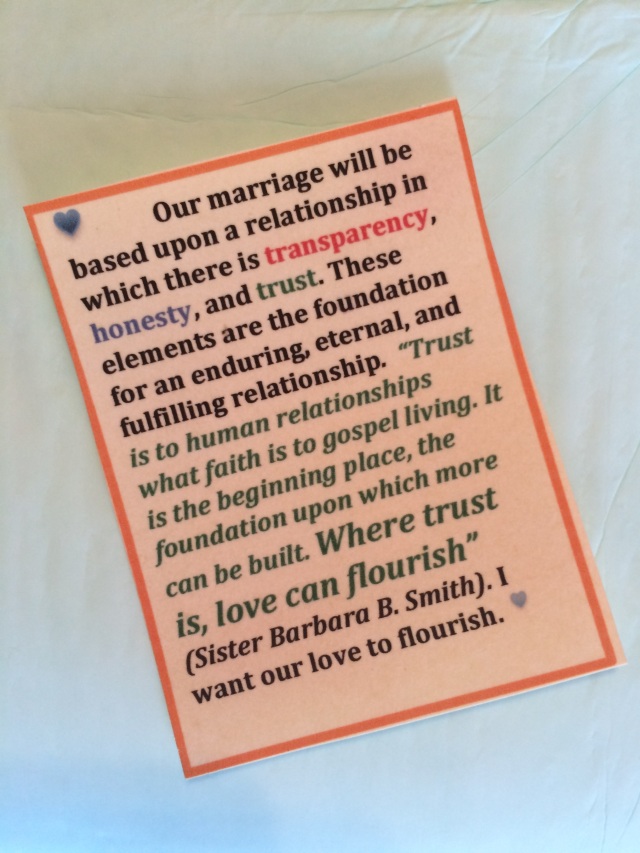
My husband prays every day, aloud, during our couple’s prayer, that he will act in ways that will build my trust. Every day, he works on his daily recovery routine and tries to do things that will build my faith in him. It’s working. But. BUT. I think I might be foolish to ever fully trust my husband, again. The total trust I once had in my husband fell to below-ground level when he disclosed (under a bit of coercion) his infidelities. I appreciate my husband’s consistent efforts to win back my trust, but (there’s that word, again!) I don’t know if I can, will, or want to 100% trust him, again. Maybe, after years of healing under my belt, I’ll feel differently. Right now, the thought of giving my husband complete trust makes me cringe with fear!
Will our marriage ever fully recover if I can’t totally trust my husband? Why can’t I just close my eyes, cross my arms over my chest, and fall back with the full knowledge that my husband will catch me? Is it because I did that for almost thirty years only to discover the person I most trusted and who was supposed to catch me wasn’t even present? My trust was betrayed!
Though I feel I have forgiven my husband, forgiveness is not the same as trusting someone.
Trust is earned; forgiveness is given freely (Rhyll Crowshaw, What Can I Do About
HimMe?).
The trust issue has been on my mind since a few days ago, after my husband got a text from a female client. The text popped up when I was using his phone while mine was charging. The text was strictly business. I have known about this client, but I haven’t met her. So, I started to ask the betrayed-wife kind of questions. “Is she pretty?” “Are your conversations always professional?” “Is there any flirting or even a hint of flirting?”
My husband was defensive, at first, but then he patiently answered every single question. Then he paused before asking me, “Do you remember us having this conversation weeks ago?”
Nope! I sure didn’t remember. That doesn’t mean that we didn’t talk about it. My trauma brain doesn’t remember much.
Things changed for a short time after that. My husband kind of detached from me for the rest of the day. That evening, he said, “I’m tired. I’m burned out.” I didn’t understand exactly what he meant until he added, “Can you take care of dinner on Sunday?” That’s when I realized what “burned out” meant. You see, my husband, ever since D-Day, has taken charge of our Sunday family dinners. It is one of the many things he does to demonstrate to me that he is worthy of my love, that he is worthy of my trust. I never asked him to do it, nor have I expected him to do that or anything else! He just insists on making Sunday dinner, driving me the long distance to group meetings, complimenting me when it’s appropriate, calling or texting throughout the day, etc., etc., and etc. . Well, he took a very short hiatus from his trust-building activities when he realized his efforts might not produce perfect results.

And I don’t blame him! This is a dilemma for both of us! He works hard to have me trust him while I’m working hard to never have a trust fall experience again. How is this resolved? It seems our efforts are in conflict.
Maybe, just maybe, we both have to accept that trust between us is going to look differently from the way it looks for other couples. Our trust is a “wise trust” that, unlike the ease of blind trust, requires work and a process. My husband must accept there are consequences to his past behaviors and that my wise trust in him will not be regained easily or quickly. I have to accept that, in order to live whole-heartedly, I must be willing to take a few risks that allow my wise trust to grow a little while still keeping myself safe from deceit. I believe that as long as we are both diligently working to improve the trust in our relationship, we are going to have a favorable outcome. In fact, research shows that working on this trust process can actually make relationships stronger.
Rebuilding trust after a betrayal is a gamble for both people. . . . Rebuilding trust after a betrayal isn’t easy and it’s rarely fast, with many pitfalls along the way for both people. But most couples who succeed find that their relationships are much stronger for the effort (Joshua Coleman, “Surviving Betrayal”, Greater Good, Sept. 1, 2008).
“Stronger for the effort.” The end result may never be 100% trust. The end result will be a stronger relationship because we are making the effort to restore trust. I can accept that and I trust that it can happen.
I should mention that my husband’s hiatus ended after I made Sunday’s family dinner. I don’t know if my meatloaf was subpar or if my husband simply came back to recovery behavior. I think it’s the latter because I really am quite capable in the kitchen! We’re both back on track with our trust restoration work and that’s all that matters.



 How could I be so dupid? I know better. Farmer told me what I wanted to hear. When I doubted his claim, he told me more things to verify his story. I think he actually believed his own story. I don’t think he has the ability to self-analyze and be honest with himself. Many addicts also lack the ability to do honest self-reflection. How can somebody be totally honest with others when they can’t be honest with themselves?
How could I be so dupid? I know better. Farmer told me what I wanted to hear. When I doubted his claim, he told me more things to verify his story. I think he actually believed his own story. I don’t think he has the ability to self-analyze and be honest with himself. Many addicts also lack the ability to do honest self-reflection. How can somebody be totally honest with others when they can’t be honest with themselves?